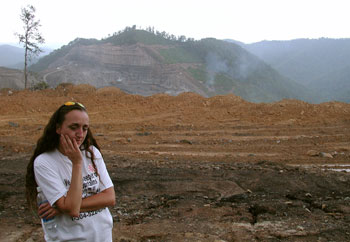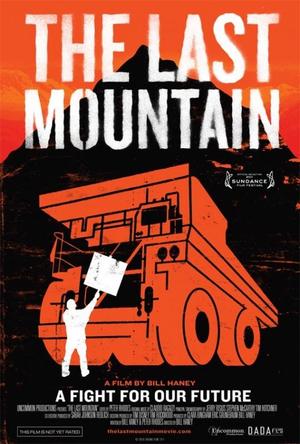 In West Virginia, the victor in the fight against mountain-top mining will decide the fate of much more than mountain tops. It will determine the safety of well water across the country, the health of a slew of West Virginian school children and the length of man’s time here on Earth. Big issues to tackle in less than two hours, but director Bill Haney‘s determined to make his case.
In West Virginia, the victor in the fight against mountain-top mining will decide the fate of much more than mountain tops. It will determine the safety of well water across the country, the health of a slew of West Virginian school children and the length of man’s time here on Earth. Big issues to tackle in less than two hours, but director Bill Haney‘s determined to make his case.
The “last mountain” in question is the Coal River Mountain, the final range not topped-off by corporate machinery in the region of Appalachia. Featuring devastating aerials of these stripped mountain tops and intense, personal interviews with locals whose lives have changed due to the artificially-altered flow of water, The Last Mountain believes in the revolutionary spirit of its audience.
Haney’s antagonist, Massey Energy, sells itself. A large corporation notorious for breaching safety statutes and breaking unions in favor of smaller wages and non-existent benefits, it’s almost fictional how corrupt these businessmen are. This provides for some hardy, if not worrisome, comic relief. After all, building what amounts to a leaky dam of coal waste directly above a local school feels morally wrong without even considering its legal ramifications. Don Blankenship, the now-former CEO of the company, spouts fear campaigns to a group of local West Virginians while wearing an American flag tee-shirt and blaming big government. Trey Parker and Matt Stone couldn’t do better than this.
The real challenge is in finding a through-line between climate change, D.C. lobbying and local sob stories. And Haney’s got no Erin Brockovich, which poses a bit of a problem. There’s a close call in the form of Jennifer Hall-Massey, a woman from a West Virginian town called Prenter, who made public the rampant slew of brain tumor victims around her small town. She had the water tested, which, of course, came back toxic. Unfortunately, her success is not that which Hollywood celebrates.
Not yet at least. So Haney tries from multiples angles, from a local dad marching on the coal-supporting governor’s office with his daughter and a small, rowdy group of protestors in toe to the trials and tribulations of activist Robert Kennedy Jr.
Kennedy comes closest to the hero of the film, running around making speeches and debating with people like the president of the Coal Miner’s Association. The lawyer from this storied American family is a presence throughout the many narratives, coming dangerously close from running the film away from the topics at hand. Thankfully, the Jackie-O/JFK archival footage and Bobby Jr. antidotes with President Uncle John are on display just enough to convince the audience of a better time, nothing more.
There’s a lot to cover in 100 minutes and Haney’s determined to keep his viewers involved. The future prospects of wind energy collides with the lackluster changes made by the Obama administration thus far, garnering hope and then questioning that very same optimism. It’s a film about the beginning stages of a change that’s been in the beginning stages for far too long.
And though it lacks the narrative drama of something like Davis Guggenheim’s Waiting For ‘Superman,’ this quick-moving, fact-spewing doc both illustrates the seemingly-insurmountable spider wed that is democratic policy and the simple, measurable change of peaceful protests, even in these dark times.
The Last Mountain opens in theaters in June.

Will you see The Last Mountain in theaters? Does this topic interest you?

